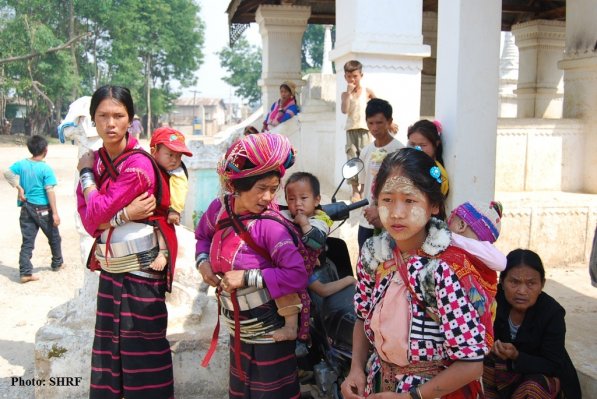Over 1,000 villagers face an escalating humanitarian crisis in northern Shan state, after being forced from their homes by fighting between government forces and ethnic minority rebels since late March, according to local sources.
Aid workers say that hundreds of families from Tangyan township are in dire need of food and shelter as Burmese troops continue to step up their military assault against the Shan State Army-North (SSA-N) in northeastern Burma. Displaced families from villages surrounding Loi Se Hill have fled to Tangyan town, where they are being cared for by local charities and religious groups.
A spokesperson for the Wong Metta charity group, who is looking after some of the displaced, told DVB they urgently need to build more makeshift huts ahead of the rainy season. According to the Shan Herald Agency for News (SHAN), rebels have compiled a list of over 700 households, who have been forced to flee.
Displaced villagers say they are quickly running out of food, but are too scared to return home. “We have nowhere to seek help but we also cannot return home,” explained a local Palaung man. “Our rice is gone – and we could get stabbed and die and no one would even know.”
“My house has been disassembled – so returning to the village is no longer an option. It’s difficult as we had no rice or crops left there,” another displaced local told DVB. “We are trapped between the two [forces] shooting at each other.”
Clashes between the SSA-N and the Burmese army have multiplied since late February, when government forces began targeting rebel bases near Tangyan. Human rights activists say the Burmese army is amassing troops in the area in a bid to squeeze out the SSA-N from its territories along the Salween River, where a Chinese-backed mega dam project is set to be built.
“Villagers dare not stay in their villages any more and have fled to Tangyan town. Burmese troops have stopped villagers from taking food with them,” warned the Shan Human Rights Foundation (SHRF) last month.
The SHRF has accused the Burmese army of carrying out mass atrocities against civilians, including arbitrary killings, looting and using villagers as porters and human shields. A women’s rights group has also collected testimonies from women and boys, who say they have been raped or sexually assaulted by Burmese troops nearby.
The activists have called on the government to hold its troops to account for the atrocities and for the international community to pressure President Thein Sein, who has been widely lauded for introducing democratic reforms in Burma.
The SSA-N signed a fragile ceasefire agreement with the government in January 2012, but the two sides have clashed repeatedly ever since. The rebel’s political wing — the Shan State Progressive Party (SSPP) — says the ongoing violence is likely to impede the peace-making process.
“If it continues, war is inevitable,” SSPP spokesman Sai La told SHAN. “If the war goes on, the people will have to flee.”



